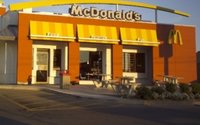
McDonald’s distributed 2,500 pieces of content last year and has already
doubled that number this year. According to Deborah Wahl, CMO at McDonald’s USA, the need to be a prolific content creator -- much of it in real-time -- was one reason the company believed that
it needed a new type of ad agency when it called a creative review in April.
That review ended with a decision last month to select Omnicom to create an agency (still unamed) dedicated
to the fast-food chain’s business -- one that is overseen by DDB CEO Wendy Clark, who led Omnicom’s pitch for the account.
Wahl and Clark were at an Advertising Week session
on Monday to discuss the selection and the changing needs of marketers in the digital era.
Those needs are changing largely because of consumers and the different ways that they can now
engage with media, content and marketers.
advertisement
advertisement
As for the 5,000 pieces of content that McDonald’s has created this year, Wahl said, “We’re just getting started.” That
may seem like a lot of content, but it pales in comparison to the 26 million customers that the chain serves every day.
And when the moderator of the Advertising Week session, Fast
Company’s Eric Alt, asked skeptically whether the company thought it could please everybody, Wahl responded, “you do have to try to please everyone.” And that means that every
marketing message -- including tweets -- counts.
The consumer conversation around McDonald’s is virtually nonstop—once every 2 seconds someone somewhere is saying something
about the brand. The brand in turn responds every ten seconds.
That’s a lot of tweeting, and other forms of messaging. And in an era where consumers increasingly expect
authenticity from brands Wahl said her mantra is “never best, always better,” meaning that there is always room for improvement in the way the brand talks to consumers. “Brands have
to work at being invited to the conversation,” she said.
For Clark, the McDonald’s review was something of a trial by fire, given that the RFP came just four months after she
started as the agency’s North American CEO. The RFP was directed to the holding company, but DDB was the agency with a 40-plus year relationship with brand in the U.S. and she was tasked with
leading the pitch.
The RFP was “voluminous,” recalled Clark. The client had clearly put a lot of time and effort into planning and explaining what it wanted from its agency
relationship going forward. “We pulled together hundreds of people [from the Omnicom ranks] for 16 weeks” to work on the pitch, Clark told the Advertising Week crowd.
There
was a lot at stake for both companies. McDonald’s is one of DDB’s bigger clients, spending more than $800 million a year on ads, per Kantar Media.
The brand’s mission is
to keep growing and succeeding, which is increasingly difficult in light of “historical success,” said Wahl. Internally the brand had to make changes as well, including streamlining its
marketing operations, which included reducing the number of P&Ls and silos, many of which included redundant marketing activities.
On top of all that, chemistry between agency and
marketer was a key ingredient. “We had to build humanity into the process,” said Wahl. And while procurement has cast a shadow over the agency-client relationship for years, Wahl stressed
a key objective for her was to make sure that “there was room for growth and advantage for everyone.” That included a “built-in” profit for Omnicom (inclusive of performance
metrics), despite reports that Omnicom agreed to terms of a no-profit deal for years.
Clark added that chemistry in part was achieved “at 2 a.m.” with a lot of
“critiquing, reordering and changing.” At the end of the process, when agency and client were “low on sleep and out of time, we believed in each other,” Clark said.